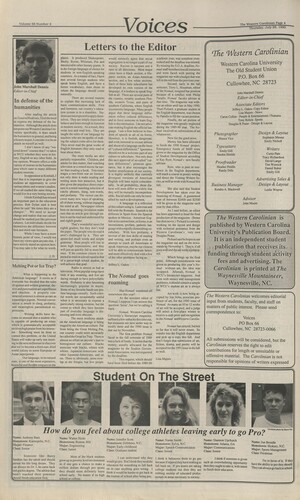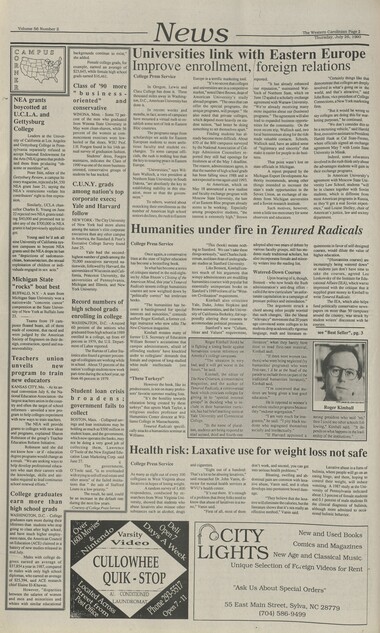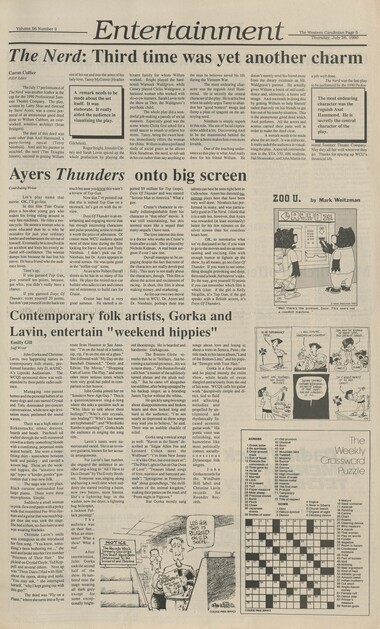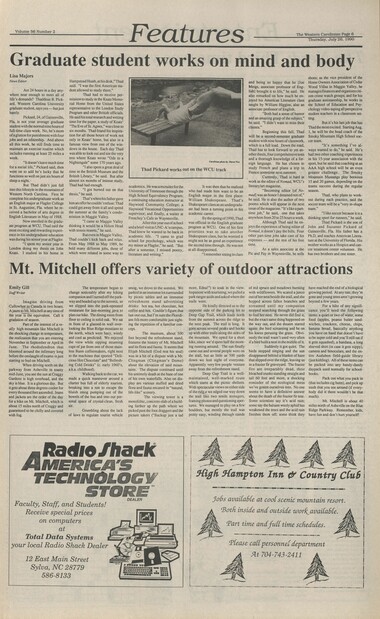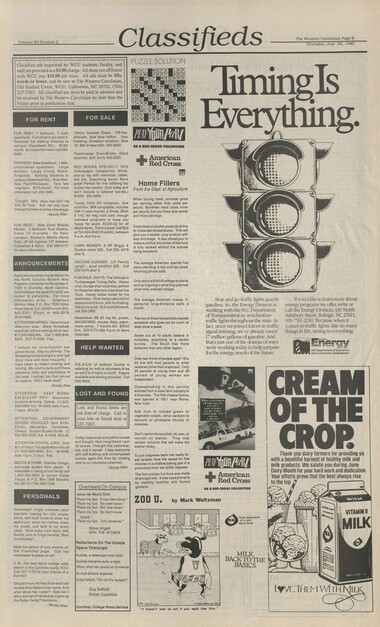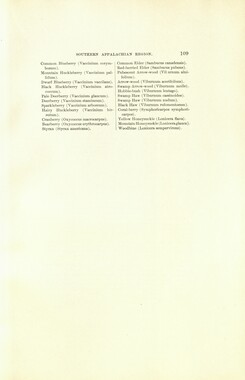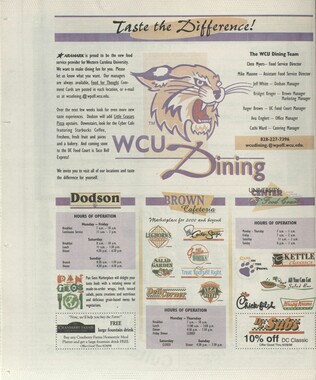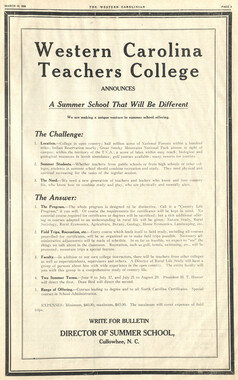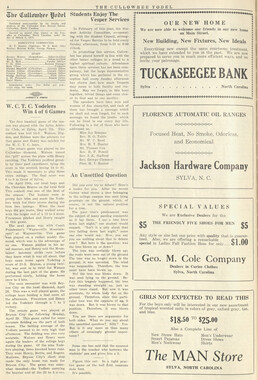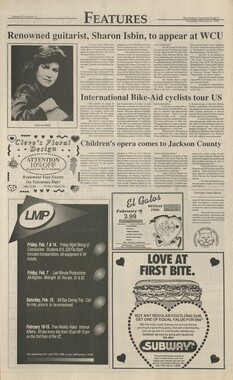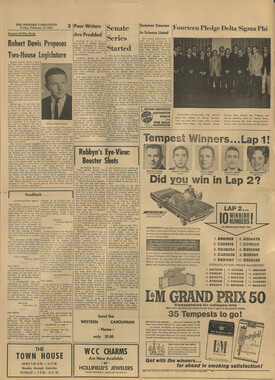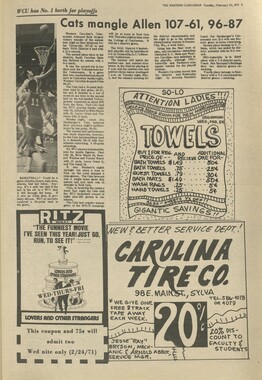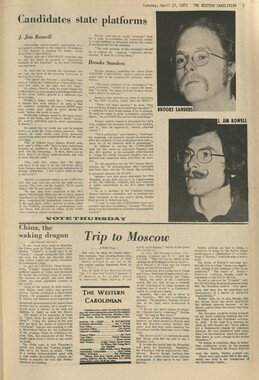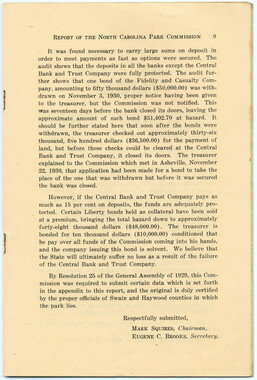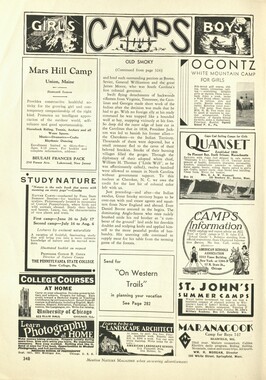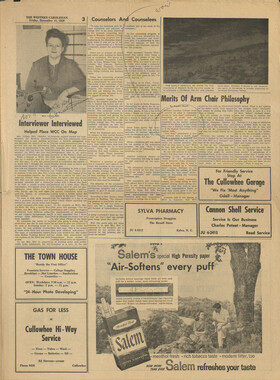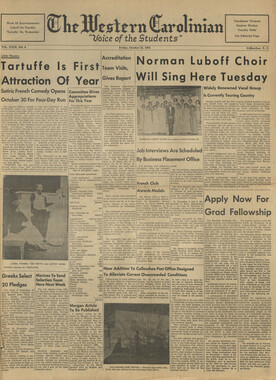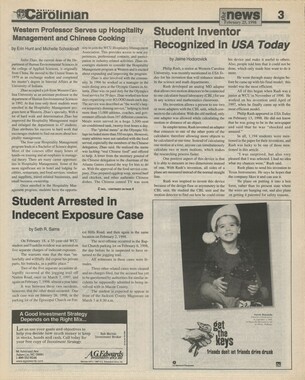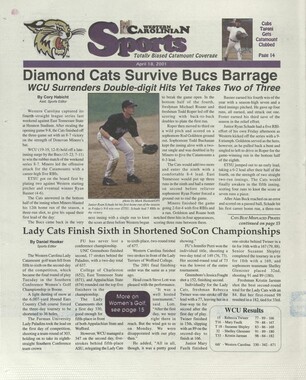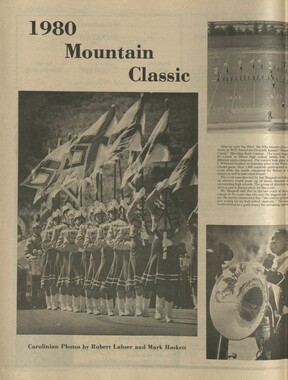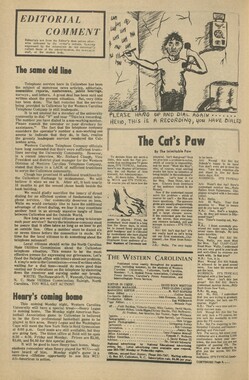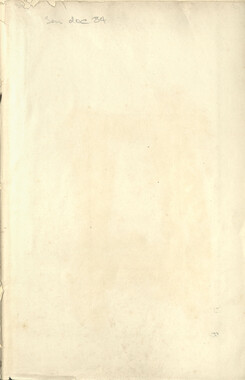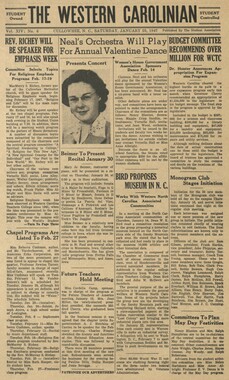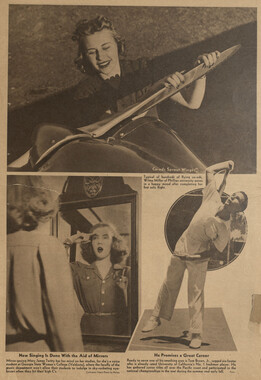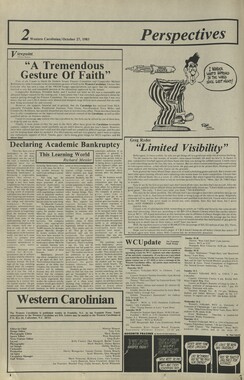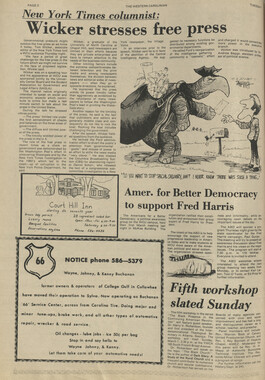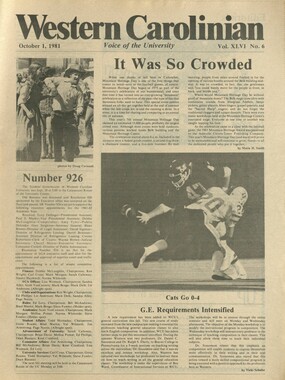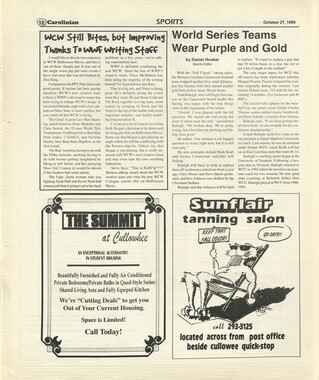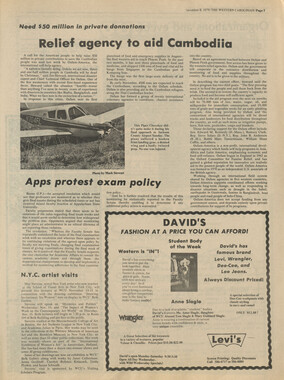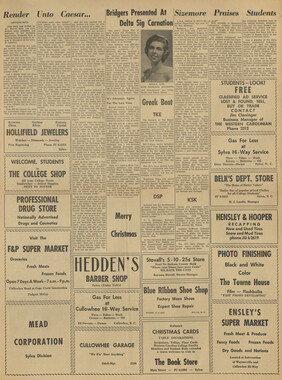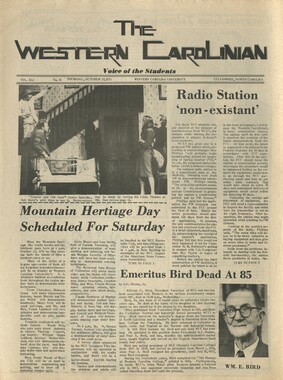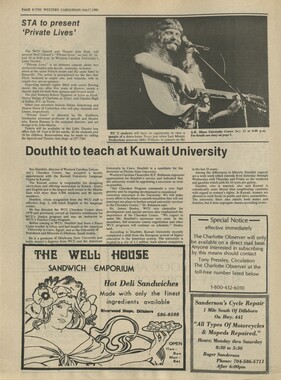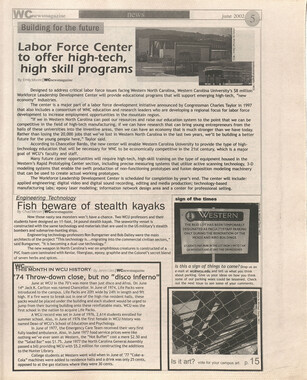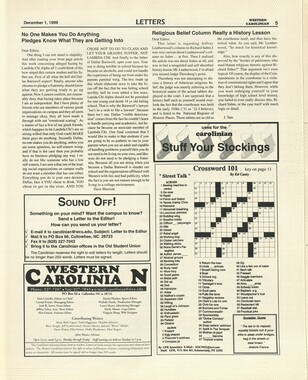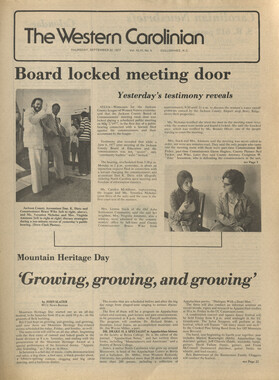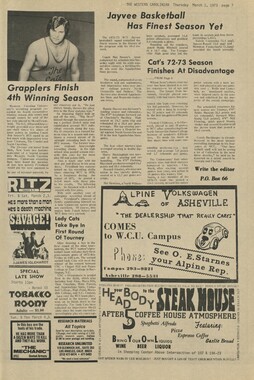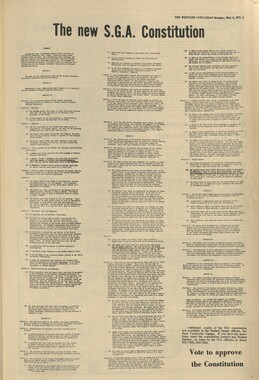Western Carolina University (20)
View all
- Canton Champion Fibre Company (2308)
- Cherokee Traditions (293)
- Civil War in Southern Appalachia (165)
- Craft Revival (1942)
- Great Smoky Mountains - A Park for America (2683)
- Highlights from Western Carolina University (430)
- Horace Kephart (941)
- Journeys Through Jackson (154)
- LGBTQIA+ Archive of Jackson County (15)
- Oral Histories of Western North Carolina (314)
- Picturing Appalachia (6679)
- Stories of Mountain Folk (413)
- Travel Western North Carolina (160)
- Western Carolina University Fine Art Museum Vitreograph Collection (129)
- Western Carolina University Herbarium (92)
- Western Carolina University: Making Memories (708)
- Western Carolina University Publications (2283)
- Western Carolina University Restricted Electronic Theses and Dissertations (146)
- Western North Carolina Regional Maps (71)
- World War II in Southern Appalachia (131)
University of North Carolina Asheville (6)
View all
- Allanstand Cottage Industries (62)
- Appalachian National Park Association (53)
- Bennett, Kelly, 1890-1974 (1295)
- Berry, Walter (76)
- Brasstown Carvers (40)
- Carver, George Washington, 1864?-1943 (26)
- Cathey, Joseph, 1803-1874 (1)
- Champion Fibre Company (233)
- Champion Paper and Fibre Company (297)
- Cherokee Indian Fair Association (16)
- Cherokee Language Program (22)
- Crowe, Amanda (40)
- Edmonston, Thomas Benton, 1842-1907 (7)
- Ensley, A. L. (Abraham Lincoln), 1865-1948 (275)
- Fromer, Irving Rhodes, 1913-1994 (70)
- George Butz (BFS 1907) (46)
- Goodrich, Frances Louisa (120)
- Grant, George Alexander, 1891-1964 (96)
- Heard, Marian Gladys (60)
- Kephart, Calvin, 1883-1969 (15)
- Kephart, Horace, 1862-1931 (313)
- Kephart, Laura, 1862-1954 (39)
- Laney, Gideon Thomas, 1889-1976 (439)
- Masa, George, 1881-1933 (61)
- McElhinney, William Julian, 1896-1953 (44)
- Niggli, Josephina, 1910-1983 (10)
- North Carolina Park Commission (105)
- Osborne, Kezia Stradley (9)
- Owens, Samuel Robert, 1918-1995 (11)
- Penland Weavers and Potters (36)
- Roberts, Vivienne (15)
- Roth, Albert, 1890-1974 (142)
- Schenck, Carl Alwin, 1868-1955 (1)
- Sherrill's Photography Studio (2565)
- Southern Highland Handicraft Guild (127)
- Southern Highlanders, Inc. (71)
- Stalcup, Jesse Bryson (46)
- Stearns, I. K. (213)
- Thompson, James Edward, 1880-1976 (226)
- United States. Indian Arts and Crafts Board (130)
- USFS (683)
- Vance, Zebulon Baird, 1830-1894 (1)
- Weaver, Zebulon, 1872-1948 (58)
- Western Carolina College (230)
- Western Carolina Teachers College (282)
- Western Carolina University (1794)
- Western Carolina University. Mountain Heritage Center (18)
- Whitman, Walt, 1819-1892 (10)
- Wilburn, Hiram Coleman, 1880-1967 (73)
- Williams, Isadora (3)
- Cain, Doreyl Ammons (0)
- Crittenden, Lorraine (0)
- Rhodes, Judy (0)
- Smith, Edward Clark (0)
- Appalachian Region, Southern (2393)
- Asheville (N.C.) (1886)
- Avery County (N.C.) (26)
- Blount County (Tenn.) (147)
- Buncombe County (N.C.) (1664)
- Cherokee County (N.C.) (283)
- Clay County (N.C.) (555)
- Graham County (N.C.) (233)
- Great Smoky Mountains National Park (N.C. and Tenn.) (478)
- Haywood County (N.C.) (3522)
- Henderson County (N.C.) (70)
- Jackson County (N.C.) (4692)
- Knox County (Tenn.) (21)
- Knoxville (Tenn.) (9)
- Lake Santeetlah (N.C.) (10)
- Macon County (N.C.) (420)
- Madison County (N.C.) (211)
- McDowell County (N.C.) (39)
- Mitchell County (N.C.) (132)
- Polk County (N.C.) (35)
- Qualla Boundary (981)
- Rutherford County (N.C.) (76)
- Swain County (N.C.) (2017)
- Transylvania County (N.C.) (247)
- Watauga County (N.C.) (12)
- Waynesville (N.C.) (68)
- Yancey County (N.C.) (72)
- Aerial Photographs (3)
- Aerial Views (60)
- Albums (books) (4)
- Articles (1)
- Artifacts (object Genre) (228)
- Biography (general Genre) (2)
- Cards (information Artifacts) (38)
- Clippings (information Artifacts) (191)
- Crafts (art Genres) (622)
- Depictions (visual Works) (21)
- Design Drawings (1)
- Drawings (visual Works) (184)
- Envelopes (73)
- Facsimiles (reproductions) (1)
- Fiction (general Genre) (4)
- Financial Records (12)
- Fliers (printed Matter) (67)
- Glass Plate Negatives (381)
- Guidebooks (2)
- Internegatives (10)
- Interviews (811)
- Land Surveys (102)
- Letters (correspondence) (1013)
- Manuscripts (documents) (619)
- Maps (documents) (159)
- Memorandums (25)
- Minutes (administrative Records) (59)
- Negatives (photographs) (5651)
- Newsletters (1285)
- Newspapers (2)
- Occupation Currency (1)
- Paintings (visual Works) (1)
- Pen And Ink Drawings (1)
- Periodicals (193)
- Personal Narratives (7)
- Photographs (12982)
- Plans (maps) (1)
- Poetry (5)
- Portraits (1654)
- Postcards (329)
- Programs (documents) (151)
- Publications (documents) (2237)
- Questionnaires (65)
- Scrapbooks (282)
- Sheet Music (1)
- Slides (photographs) (402)
- Sound Recordings (796)
- Specimens (92)
- Speeches (documents) (15)
- Tintypes (photographs) (8)
- Transcripts (322)
- Video Recordings (physical Artifacts) (23)
- Vitreographs (129)
- Text Messages (0)
- A.L. Ensley Collection (275)
- Appalachian Industrial School Records (7)
- Appalachian National Park Association Records (336)
- Axley-Meroney Collection (2)
- Bayard Wootten Photograph Collection (20)
- Bethel Rural Community Organization Collection (7)
- Blumer Collection (5)
- C.W. Slagle Collection (20)
- Canton Area Historical Museum (2110)
- Carlos C. Campbell Collection (198)
- Cataloochee History Project (65)
- Cherokee Studies Collection (4)
- Daisy Dame Photograph Album (5)
- Daniel Boone VI Collection (1)
- Doris Ulmann Photograph Collection (112)
- Elizabeth H. Lasley Collection (1)
- Elizabeth Woolworth Szold Fleharty Collection (4)
- Frank Fry Collection (95)
- George Masa Collection (173)
- Gideon Laney Collection (452)
- Hazel Scarborough Collection (2)
- Hiram C. Wilburn Papers (28)
- Historic Photographs Collection (236)
- Horace Kephart Collection (861)
- Humbard Collection (33)
- Hunter and Weaver Families Collection (1)
- I. D. Blumenthal Collection (4)
- Isadora Williams Collection (4)
- Jesse Bryson Stalcup Collection (47)
- Jim Thompson Collection (224)
- John B. Battle Collection (7)
- John C. Campbell Folk School Records (80)
- John Parris Collection (6)
- Judaculla Rock project (2)
- Kelly Bennett Collection (1314)
- Love Family Papers (11)
- Major Wiley Parris Civil War Letters (3)
- Map Collection (12)
- McFee-Misemer Civil War Letters (34)
- Mountain Heritage Center Collection (4)
- Norburn - Robertson - Thomson Families Collection (44)
- Pauline Hood Collection (7)
- Pre-Guild Collection (2)
- Qualla Arts and Crafts Mutual Collection (12)
- R.A. Romanes Collection (681)
- Rosser H. Taylor Collection (1)
- Samuel Robert Owens Collection (94)
- Sara Madison Collection (144)
- Sherrill Studio Photo Collection (2558)
- Smoky Mountains Hiking Club Collection (616)
- Stories of Mountain Folk - Radio Programs (374)
- The Reporter, Western Carolina University (510)
- Venoy and Elizabeth Reed Collection (16)
- WCU Gender and Sexuality Oral History Project (32)
- WCU Mountain Heritage Center Oral Histories (25)
- WCU Oral History Collection - Mountain People, Mountain Lives (71)
- WCU Students Newspapers Collection (1744)
- Western North Carolina Tomorrow Black Oral History Project (69)
- William Williams Stringfield Collection (2)
- Zebulon Weaver Collection (109)
- African Americans (388)
- Appalachian Trail (32)
- Artisans (521)
- Cherokee art (84)
- Cherokee artists -- North Carolina (10)
- Cherokee language (21)
- Cherokee pottery (101)
- Cherokee women (208)
- Church buildings (166)
- Civilian Conservation Corps (U.S.) (110)
- College student newspapers and periodicals (1830)
- Dams (94)
- Dance (1023)
- Education (222)
- Floods (60)
- Folk music (1015)
- Forced removal, 1813-1903 (2)
- Forest conservation (220)
- Forests and forestry (905)
- Gender nonconformity (4)
- Great Smoky Mountains National Park (N.C. and Tenn.) (154)
- Hunting (38)
- Landscape photography (10)
- Logging (103)
- Maps (84)
- Mines and mineral resources (8)
- North Carolina -- Maps (18)
- Paper industry (38)
- Postcards (255)
- Pottery (135)
- Railroad trains (69)
- Rural electrification -- North Carolina, Western (3)
- School integration -- Southern States (2)
- Segregation -- North Carolina, Western (5)
- Slavery (5)
- Sports (452)
- Storytelling (245)
- Waterfalls -- Great Smoky Mountains (N.C. and Tenn.) (66)
- Weaving -- Appalachian Region, Southern (280)
- Wood-carving -- Appalachian Region, Southern (328)
- World War, 1939-1945 (173)
Western Carolinian Volume 56 Number 02
Item
Item’s are ‘child’ level descriptions to ‘parent’ objects, (e.g. one page of a whole book).
-
-
Volume 56 Number 2 Voices -rv,. vj^tern Carolinian Page 4 "Thursday, July 26. 1990 John Marshall Dennis Editor-in-Chief In defense of the humanities After reading the article on Tenured Radicals, I feel the need to express my defense of the humanities. Although the article does not point out Western Carolina University specifcally, it does attack the humanities in general, and being a history major, I consider it to be an attack on myself as well. I don't know of any "watered down" courses that I've taken at WCU whether they were in history, English or any other field. In my opinion, Western offers a wide variety of courses in the humanities area which cater to many different student interests. In opposition to Kimball, I feel that it is important to give the students an opportunity to cover various ethnic and women's studies. If we all studied the same thing we would live in a very boring society. I think Kimball has missed an important part in the education process. Bob Dylan said it best when he said "the times they are a changin'." We need to accept change and realize that our culture should be studied just like previous cultures. Let individuals decide for themselves the difference between first and third-rate literature. While I may have a more historic point of view, I would not force my views upon anyone else. I have merely stated an opinion here. You may take it for what its worth. J.D. Melting Pot or Ice Tray? What is happening to the American language? It seems as if everyone has decided that the rules of spoken and written grammar, diction and punctuation are superfluous and obsolete. A properly constructed sentence is almost as rare as a passenger pigeon. Normal conversation is awash in slang, profanity, and meaningless parenthetical expressions. Writing skills have become so unusual that a student who is capable of producing an essay which is grammatically acceptable receives high praise from his instructor. Something must be done to correct this problem, or the United States will wake up early one morning in the next millenium to discover that we've become a third-rate, third world colony to some European or Asian superpower. Our language, in its natural state, is one of the most expressive, beautiful and flexible tongues on the Letters to the Editor planet. It produced Shakespeare, Shelly, Byron, Whitman, Poe and innumerable other literary giants. It is the foreign language of choice for students in non-English-speaking countries. As a matter of fact, I have met several foreign students who speak better English, and have a better vocabulary, than those to whom the language should come naturally. There are several reasons to explain this increasing lack of basic communication skills. First and foremost, our country's education system is in a shambles. Students are not expected to apply themselves. They are simply expected to behave and learn enough to function in modern society. As a result, they write less and read less. They are taught the rules of our language by teachers who are incapable of making the subject come alive for them. They never read the great works of English literature; they only read or hear about them. The mass media are also partially responsible. Children, and adults for that matter, find watching television or a rented movie far easier than reading a book. Television wages a two-front war on literacy: not only does it make reading and writing seem less attractive, but it also gives the populace direct exposure to a mind-numbing selection of catchy phrases, slang, non-words, and profanity. The viewer can discover many new ways of speaking, all of them wrong, without engaging his mind at all. Newspaper editors bent on increasing circulation make sure that no article gets through unless it can be read and understood by and eighth grader. That's wonderful news for eighth graders, but they don't read the paper. The people who do read it aren't challenged by it. They are spoon-fed small words and simple grammar. Most people will rise to meet high expectations, and they will just as quickly fall to meet low ones. If the common citizen is expected to read on a level equal to that of a junior-high school student, he will achieve that goal. Radio is almost as bad as television. Most popular songs have little if any meaning, and few are daring enough to have polysyllabic words. Profanity is also becoming increasingly popular in music. Some of my favorite bands use profane language casually. Such colorful words are occasionally useful when it is necessary to express a particularly strong emotion, but the extent to which they have become part of everyday language is distressing and even obscene. The most insidious attack on the American language is being waged by the American culture. Far from being the Great Melting Pot, our country could more accurately be called the Great Ice Tray. There is almost no effort on anyone's part to homogenize our culture. Blacks associate with blacks, whites with whites, Japanese-Americans with other Japanese-Americans, and so on. There is, obviously, some overlap at the fringes, but few people would seriously agree that social segregation is no longer a part of our society. Racism is rampant and it runs in all directions. Most major cities have a black section, a Hispanic section, an Asian-American section, and a few white sections. Each of these little subcultures has developed its own version of the language, if it bothers to speak English at all. There are several parts of the country, notably southern Florida, western Texas, and parts of southern California, where English is a minority language. Many people argue that these language differences reflect cultural differences, and to force someone to learn English is discrimination. I do not advocate making English the official language. I am a firm believer in freedom of speech in all of its forms. However, it is foolish, dangerous, and even immoral to excuse misuse and abuse of a language on the basis of "cultural differences." Ignorance should not be a welcome part of any culture or subculture. Not only does this tacit approval of so-called "culture differences", promote ignorance, but it also encourages the further stratification of our society. It is highly unlikely that currently divergent versions of American English will later rejoin coinciden- tally. In all probability, these dialects will soon differ so widely that they will be mutually incomprehensible. Racial strife can only be intensified by such a development. A language is a reflection of the culture using it. Latin rose and fell with the Romans. Spanish is far different in Spain from the Spanish spoken in Mexico. American English in its current form, or forms, is an inconsistent, profane, pathetic language with a rapidly diminishing vocabulary. With less profanity, a revival of the lost skills of reading and writing, and perhaps even an attempt to teach all Americans to speak American, maybe our citizens will be able to communicate better, and more effectively deal with a few of the other problems facing us. Jeffrey L. Oakes The Nomad goes roaming Has Nomad wandered off somewhere this year? As the assistant editor of Nomad, I suppose I can answer this question: Sorta', but we're calling it back. Nomad, Western Carolina University's literary/art magazine, suffered a few setbacks this timeout, but measures are now under way to rectify them and the 1990 issue is due out by November. The first problem Nomad faced in the fall semester of 1989 was a lack of funds. It seems that the money, usually allocated for the magazine by the Student Government Association, was not requested by the deadline. This request, which should have been filed before the 1989-90 academic year, was somehow overlooked and the deadline was missed. By missing the S.G.A. deadline,Nomad staff members lostall resources and were faced with putting the magazine out with a budget that was left in the red from the previous year. Second, early in the fall( semester, Terry L. Housman, editor of the Nomad, resigned has position because of a conflict with Philip Paradis, Nomad faculty adviser at that time. The magazine was without an editor until late in May 1990. Thad Pickard, a graduate student in the English department, was chosen by Paradis to fill the vacant position. Finally, the art portion of the magazine was greatly neglected during the 1989-90 year. The Nomad received no submissions of art whatsoever. Now for the good news. Money has been allocated to finish the 1990 Nomad project. Emergency funds of $600 were given to the magazine by the Office of Student Development according to Kay Byer, Nomad's new faculty advisor. Byer, who is poet in residence in the English department, will teach a course in poetry writing and direct the Visiting Writers Series, as well as work with Nomad this fall. She also said that Student Development has taken over the financing of Nomad. A guaranteed sum of between $2400 and $2500 will be given to the magazine each year by that office. As I said before, an editor has been appointed to head the final production of the magazine. (Better late than never.) Pickard is currently working on the layout and design with technical assistance from the Western Carolinian's very own Douglas Pease. Pickard said he hopes to see the magazine out and on the newsstands by November 1. That is, if all goes well and the art work is submitted. Which brings up the final point. Although consideration was given to producing this year's Nomad without art, the idea was scrapped. Afterall, Nomad is WCU's literary/art magazine. And even with money and management problems, it should contain a sample of WCU's student art as it always has. Art work is now being accepted by Jon Jicha, associate professor of art, for the 1990 issue of Nomad. As many as 10 to 12 works of art will be accepted, and a judge will select a first-place winner to receive a cash prize and recognition in the Nomad andWestern Carolinian. Nomad has strayed, but not so far that it will never return. So wander into the English department and pick up a copy this fall. And don't forget that submission of art, fiction, drama, and poetry will be accepted for the 1991 issue in the fall as well. Lisa Majors "\ The Western Carolinian Western Carolina University The Old Student Union P.O. Box 66 Cullowhee, NC 28723 John Marshall Dennis Editor-in-Chief Associate Editors Jeffrey L. Oakes- Copy Editor Lisa Majors - News Caron Collier - People & Entertainment / Features Tony Bolick- Sports Douglas R Pease - Design & Layout Photographer Shawn Vice Typesetters Emily Gill Sandra Shields Proofreader Heather Pittillo Randy Dills Business Manager Kendra A. Blackwell Design & Layout Stephanie Messer Emily Nicholl Writers Curtis Pate Tracy Richardson David Lange Tim Womick Daniel Baker Emily Gill Advertising Sales & Design & Layout Leslie Weaver Advisor John Moore r The Western Carolinian is published by Western Carolina University's Publication Board. It is an independent student publication that receives its funding through student activity fees and advertising. The Carolinian is printed at The Waynesville Mountaineer, Waynesville, NC. r The Western Carolinian welcomes editorial input from students, faculty, and staff on matters of public interest. Please send correspondence to: Voices PO Box 66 Cullowhee, NC 28723-0066 All submissions will be considered, but the Carolinian reserves the right to edit contributions for length or unsuitable or offensive material. The Carolinian is not responsible for opinions of writers expressed (f Student On The Street How do you feel about college athletes leaving early to go Pro? Carolinian phaoi by Skawn Via Name: Anthony Bare Hometown: Kannopolis, N.C. Major: Finance Class: Senior Someone like Barry Sanders has the talent and should pcrsue his life long dream. They can always do Dr. J, he came back and got his degree. The athlete that hasn't reached their potential should finish education first. Name: Walter Hicks Hometown: Boston, MA Major: Engineering Class: Junior Name: Jennifer Scott Hometown: Dillsboro, N.C. Major: Early childhood Class: Graduate student Name: Vanne Smith Hometown: Sylva, N.C. Major: Speech Communication Class: Senior Most of the black students I can understand why they i think it behooves them to go pro grow up in poverty level environment would g0 pra But l think they need the beC£mse Jf injured they have m]h[ ^ so if one gets a chance to make a education for something to fall back M] back on. If pro teams are taking . pro teams are taking milhon dollars through pro sports on in case anything gocs wrong. T co„ students Qut thcn lhey ^ they should most definitely leave think it would be harder to get back in robbing society of educated profes- school early. No matter if its high the routine of schoo, aftcr being pro school or college. Name: Shannon Upchurch Hometown: Atlanta, GA Major: Communications Class: Senior I think if someone is given such an overwhelming opportunity then they ought to take it, with intent to finish their education. Name: Jon Brendle Hometown: Hickory, N.C. Major: Sports Management Class: Freshman I'm in favor of it If they have the ability to pro they should. They can always go back to school. sionals in areas necessary to society. J)
Object
Object’s are ‘parent’ level descriptions to ‘children’ items, (e.g. a book with pages).
-
The Western Carolinian is Western Carolina University's student-run newspaper. The paper was published as the Cullowhee Yodel from 1924 to 1931 before changing its name to The Western Carolinian in 1933.
-

